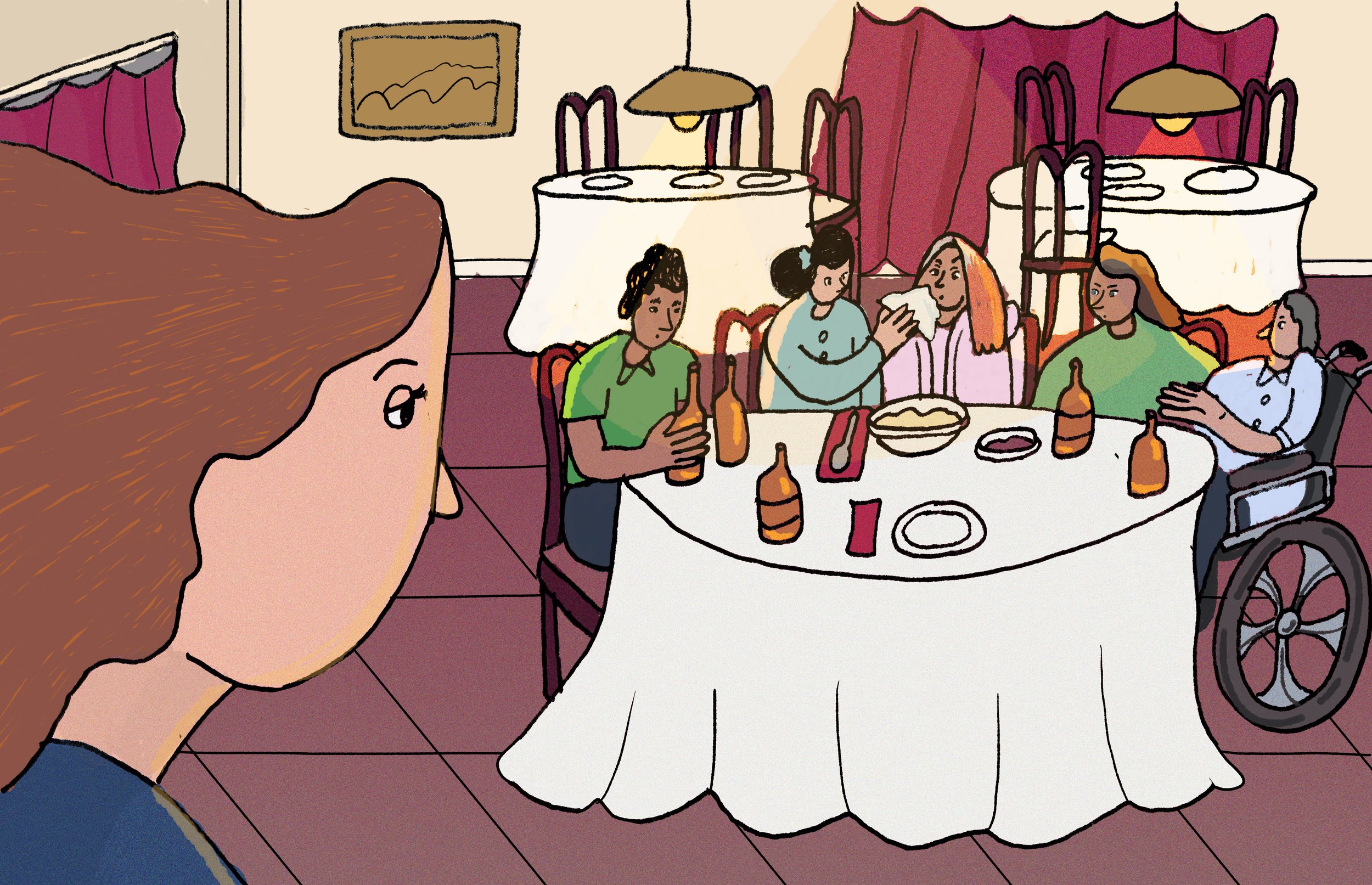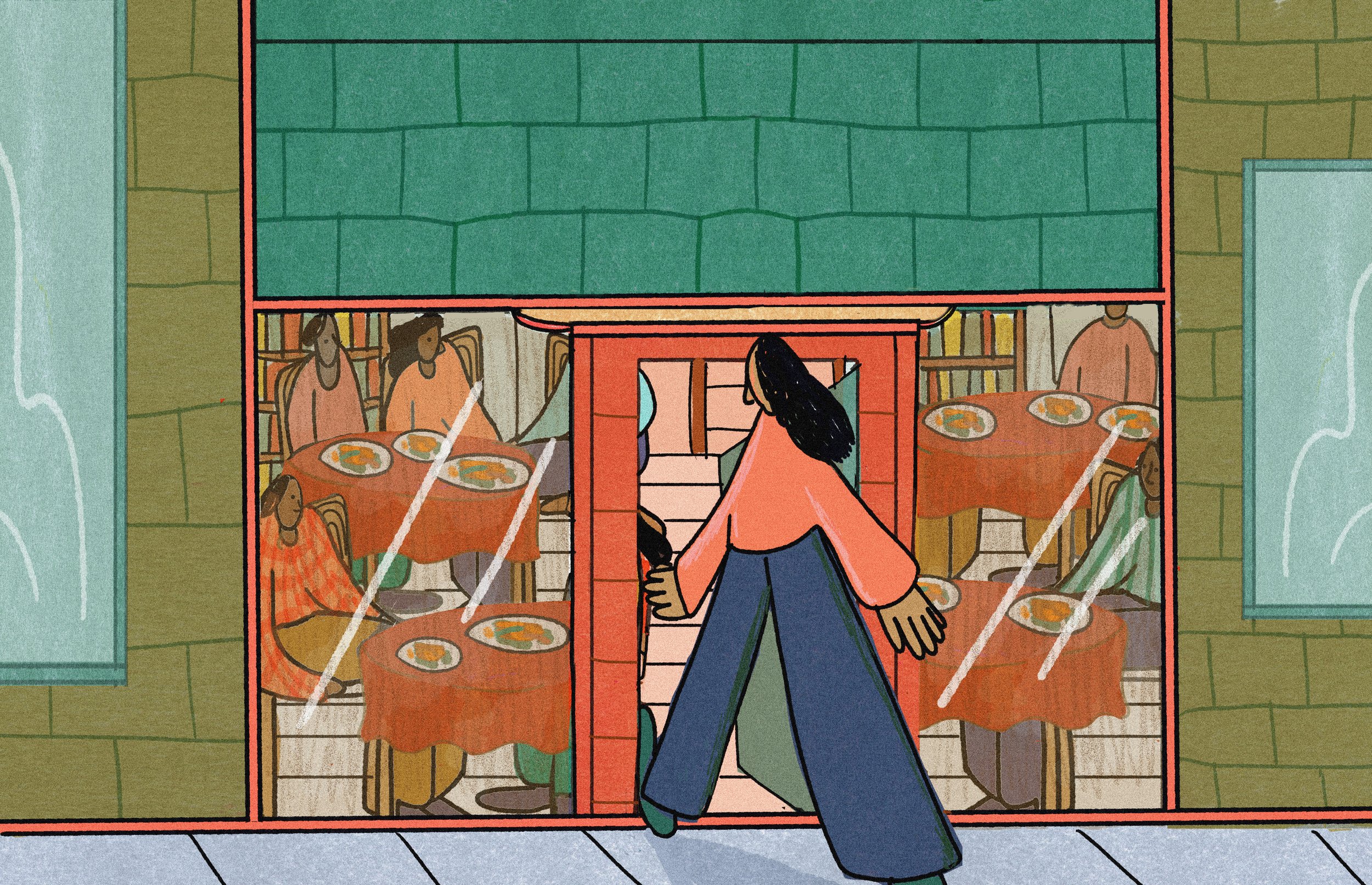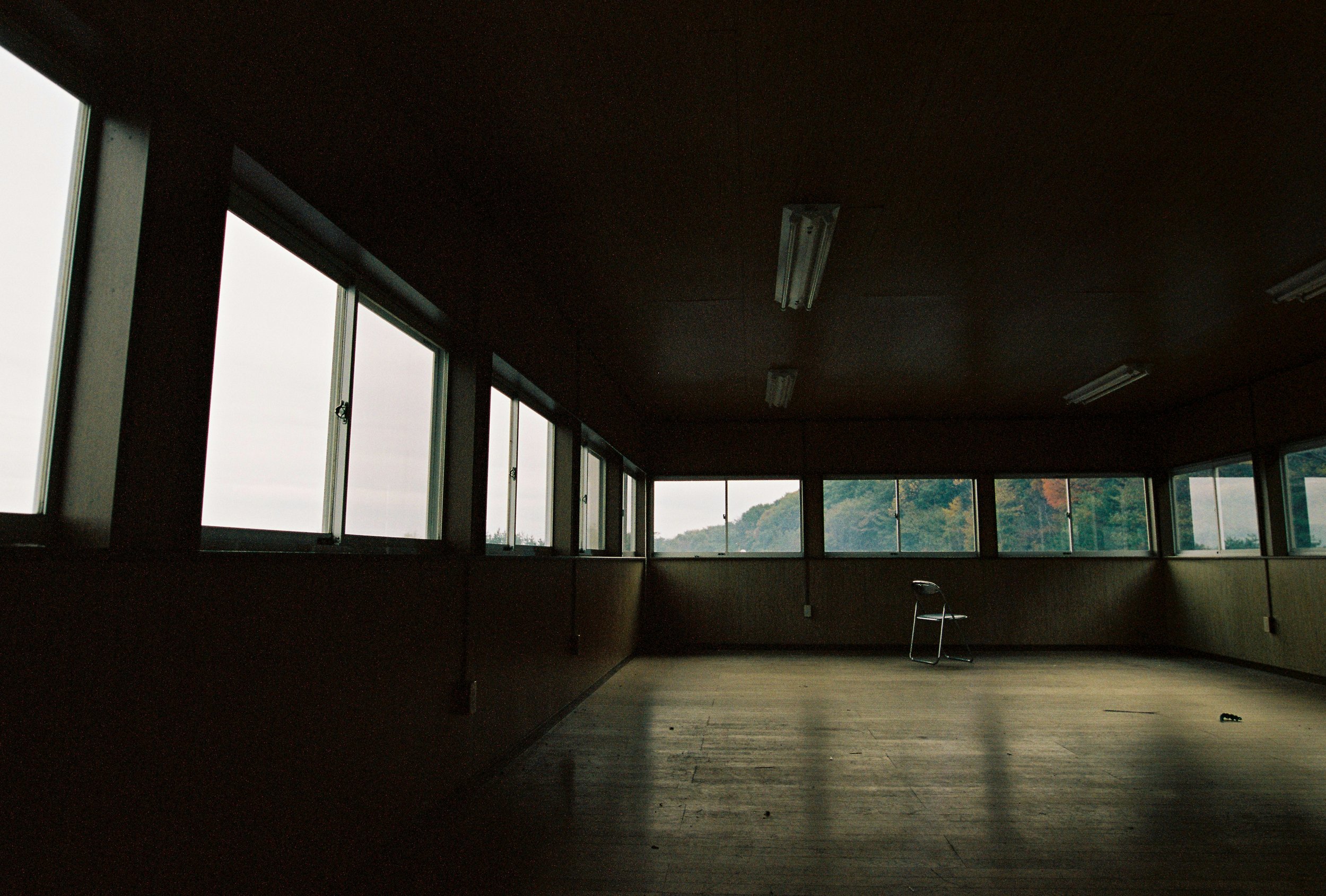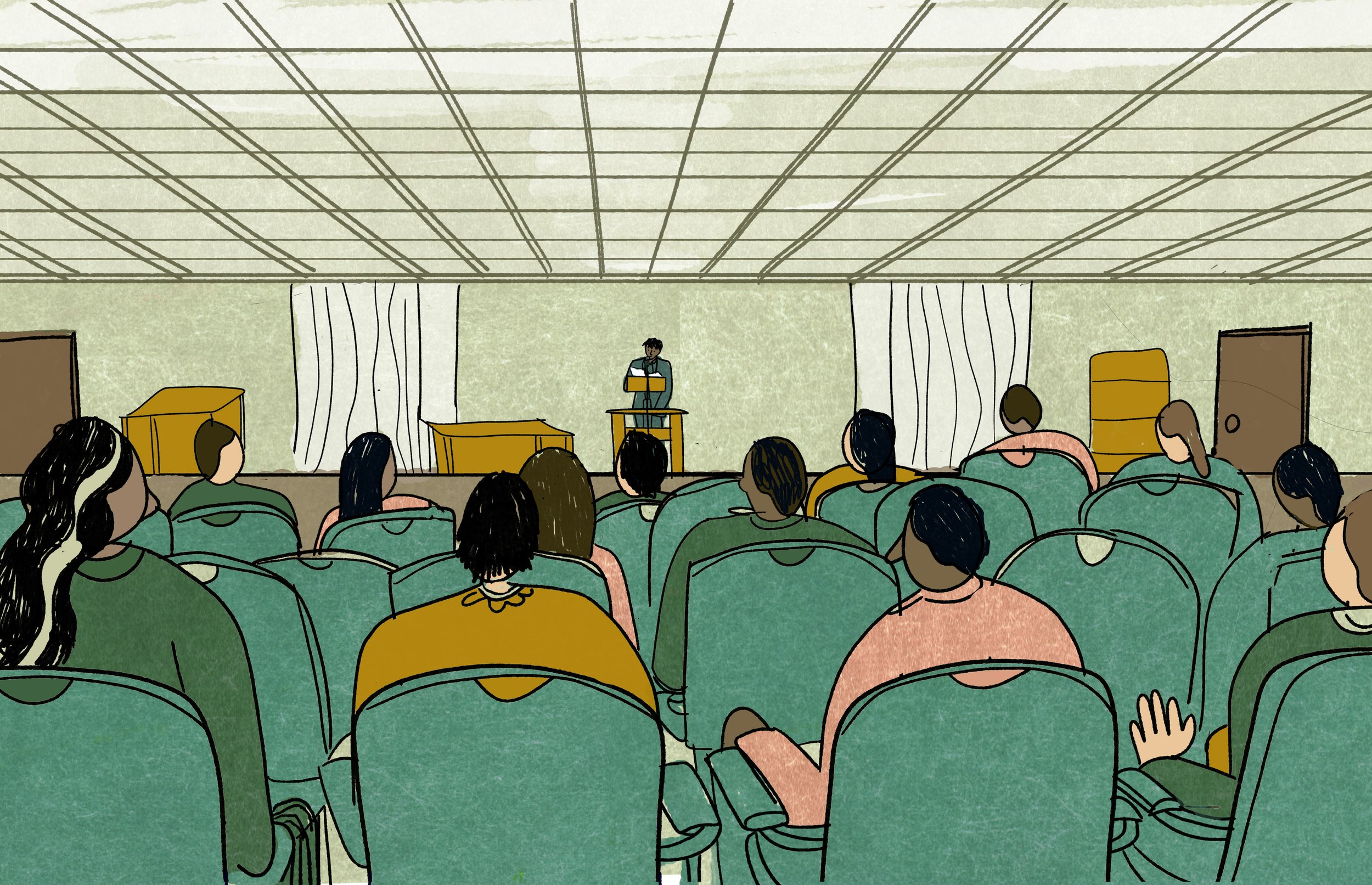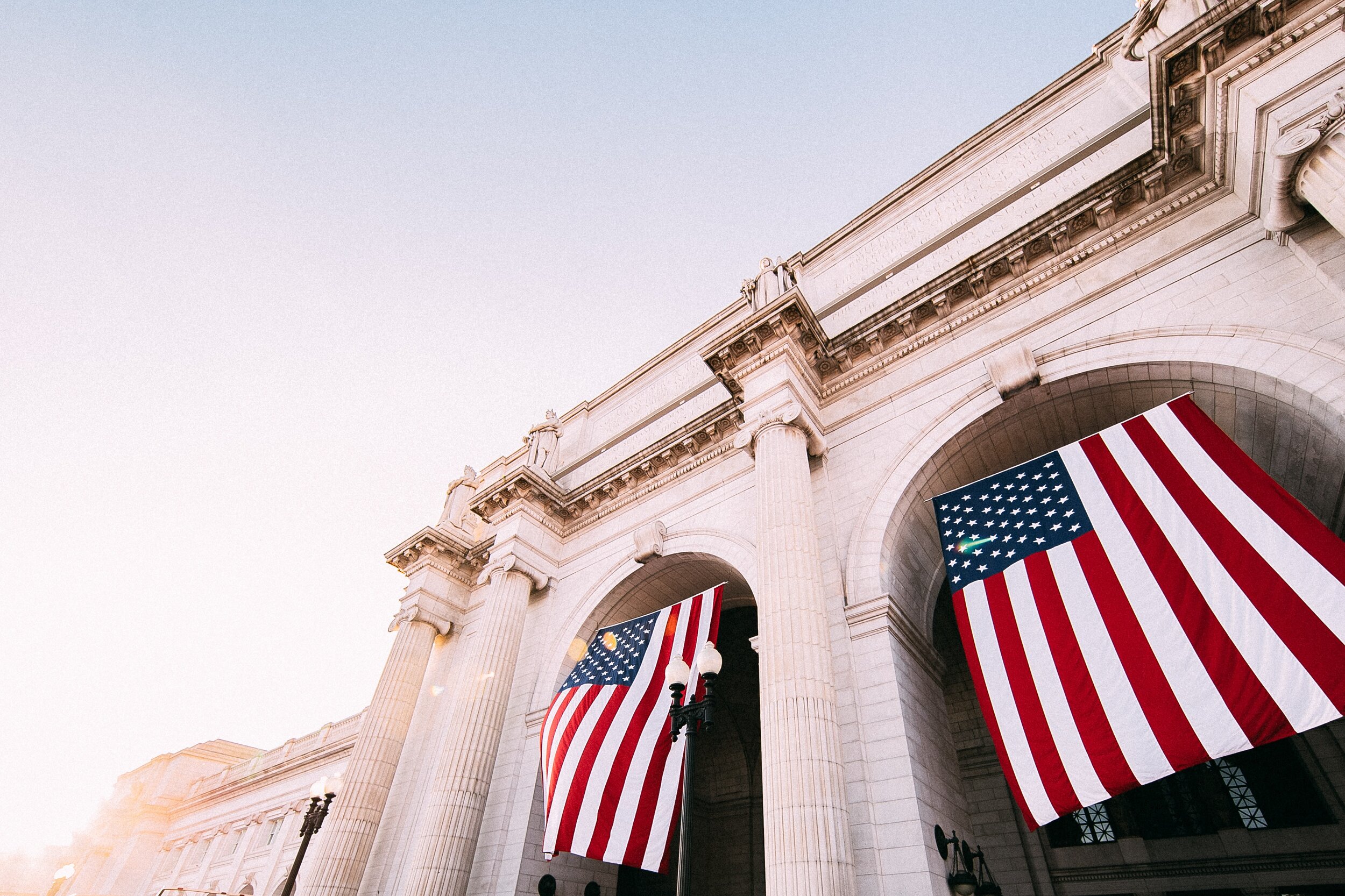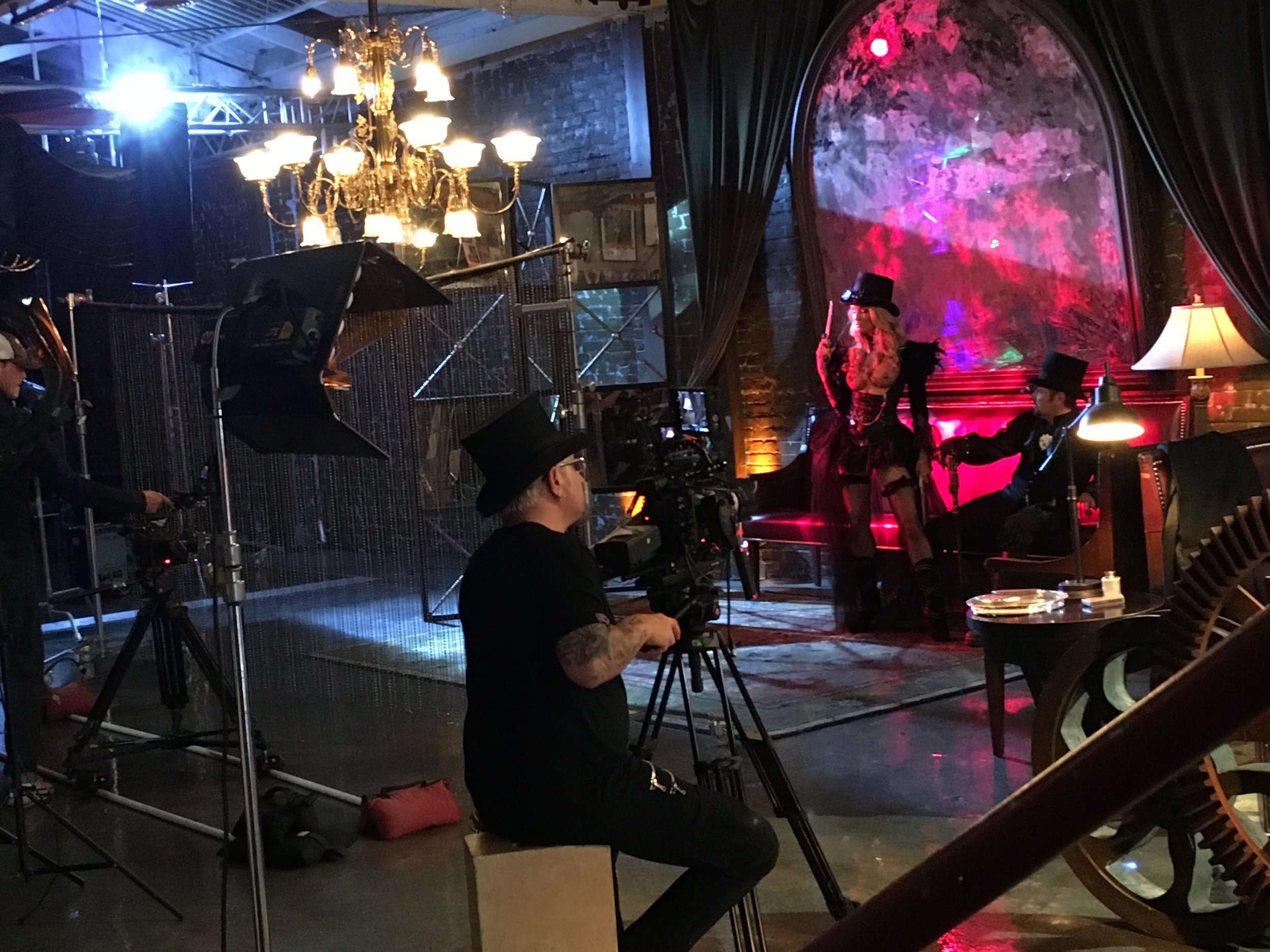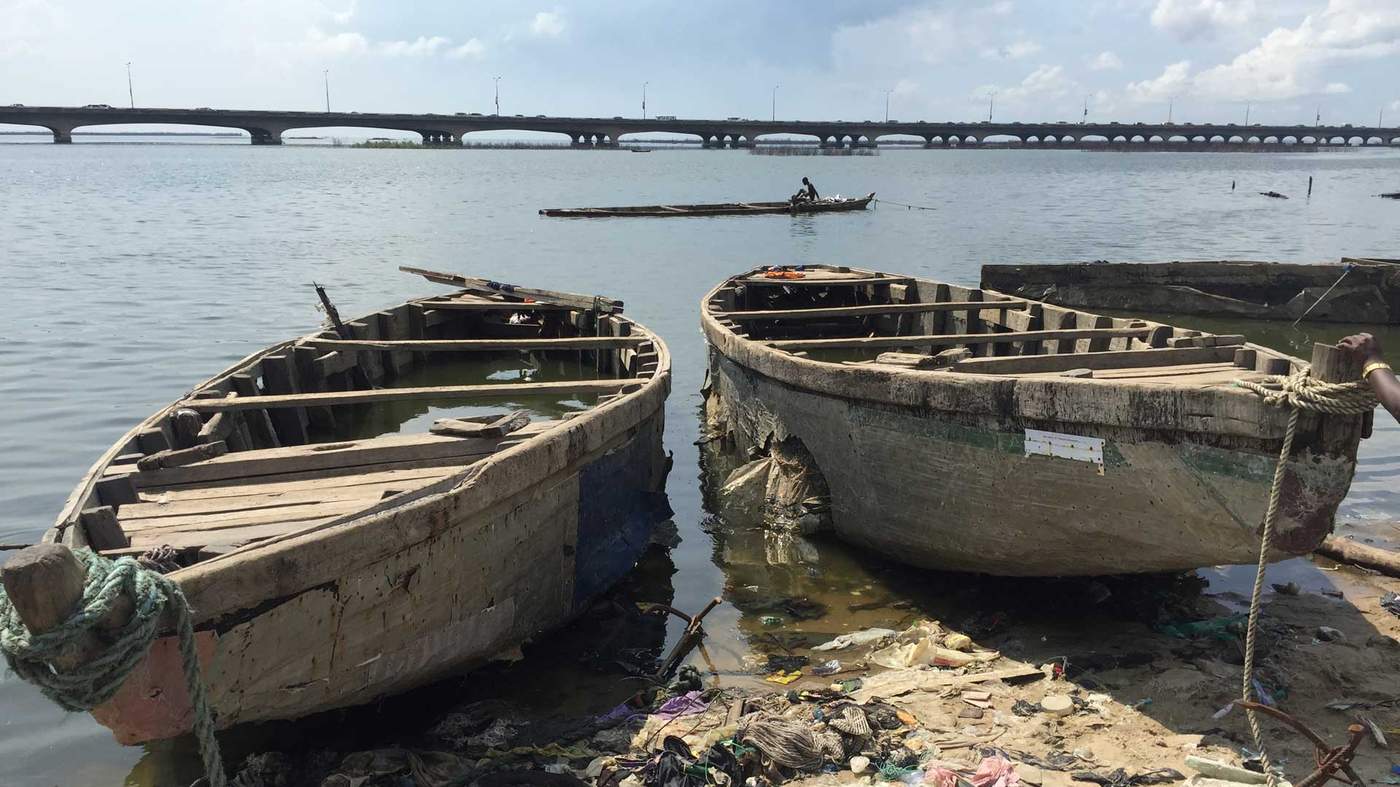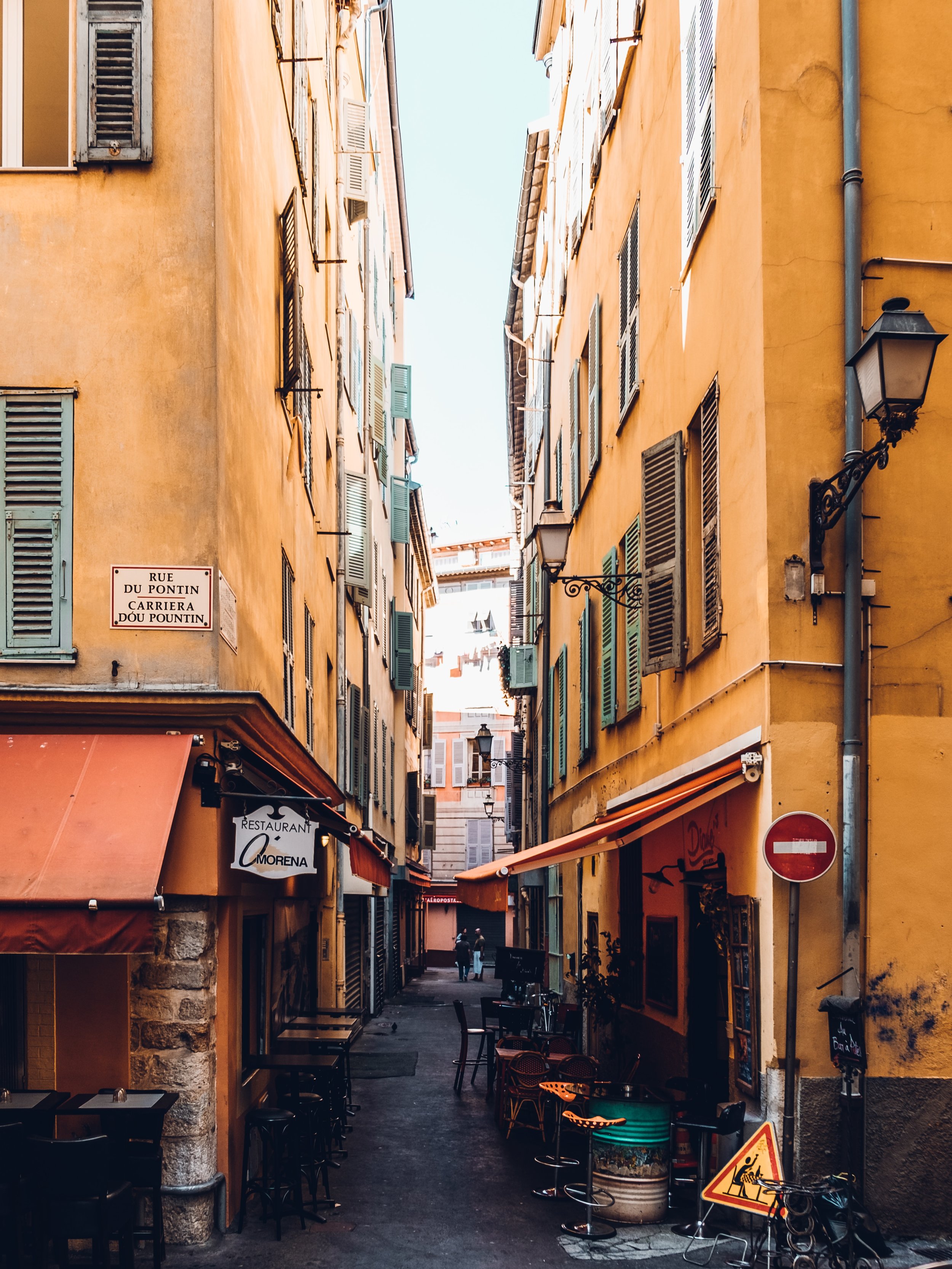Whispers from Wadi Rum

Sunny Fitzgerald was the only female journalist reporting on a 44-day trek across Jordan. Among the all-male crew of hikers and staff, slogging through desert dunes and whipped by the wind, she did not expect to fall in love.
“I’m not in the mood, Sunny,” he snaps, barely lifting his flushed face.
Sapped by another day spent in the desert sun, Sanad’s slender frame slumps like a rag doll in the shade of ancient stones.
I’m crouched in the sand beside him, sheepishly holding a twig I’ve just used to tickle a sliver of stomach between his sweat-drenched shirt and dusty shorts.
Sanad is neither quick to anger nor one to shout. He’s more likely to retreat into silence and himself. I’ve learned to read the ever-changing angles of his face and subtle arcs of his body: The way his forehead creases and shoulders curve when he’s burdened by his boss. How his chest opens and head tilts slightly to one side when he’s feeling playful. The irrefutable way his eyes widen and shine when he looks into mine.
But I don’t recognize the irritation in his reproach. I speak the unspoken language of Sanad, but I am not yet fully fluent. After all, we’ve only known each other for 37 days.
Confused and indignant, I dig my toes into the sand, toss the twig to the ground, and spring to my feet. The lunar-like landscape of Wadi Rum stretches out before me—at once alluring and overwhelming in its enormity. I am an insignificant speck, not unlike the grains of sand beneath my bare feet.
The lonely horizon and unending cerulean sky beckon with promises of solitude. But even here in this wide-open space, I can’t escape. I’m a Jordan Trail thru-hiker committed to a 44-day trek across the entire country. And Sanad—a key member of the local Jordan Trail support team—is stuck with me.
A flash flood of emotions swells and surges, propelling my aching legs to practically leap toward my tent. I’m exhausted. Sunburnt. Wind-whipped. And wondering if Sanad’s going to give up—on me and the trail.
I wouldn’t blame him if he does. He’s been working around the clock, managing logistics, campsites, meals, and moods of anywhere from seven to more than two hundred hikers on a given day. The trail has taken a toll on him. And maybe I have, too?
“Don’t come near me!” I shouted through the dim light of dawn this morning. I was preparing my backpack and Sanad had simply stepped toward me to help. But he and I had long elapsed the days when our interactions were simple. His care of me (and equally, mine for him) was under the constant watch of critical eyes.
All images by Sunny Fitzgerald.
I wasn’t saying (or shouting) what I meant. I wanted him near me; it was others on the trail that didn’t.
“Sunny, you can’t sit with Sanad,” his supervisor insisted earnestly on Day 15, pulling me into the dark after dinner to declare: “You have to sit with the group or others will get jealous.”
I laughed, assuming he’d crack a smile and confirm it was just a joke. I had no reason to think otherwise. We’d had only amiable interactions until now. And surely, there’d be no assigned seats in this wide open, wild space?
I was wrong.
Straight-faced, his supervisor claimed some of the men had complained. And it seemed he was hoping I’d quietly comply. But why? I’m not an escort; I’m a journalist. And I like my relationships to evolve organically—not on demand.
“On the trail, we were stripped down to exactly who we are. Sanad and I saw each other at our best, worst, and our grittiest.”
I’d made a genuine connection with Sanad from the start. There was the possibility that other friendships might also form over the many miles ahead but I’d never agreed to provide entertainment for anyone. I’d signed up to hike across the country, to see a piece of the Middle East beyond the politicized headlines and search for untold stories to share.
Now I’d unknowingly become the subject of someone else’s stories.
“Don’t spend so much time with Sunny,” a member of the trail team told Sanad on Day 23 (and on multiple days thereafter). “People will talk.”
He was right.
Some talked behind our backs and others, directly in front of us. Or rather, over me. If I spoke to Sanad out in the open, someone would bark his name across the campsite or approach us and interrupt—at times, even physically stepping between us. My words were trampled so frequently on the trail I began to wonder whether I existed at all. Had I already died in the desert and become a conflicted apparition, unable to crossover and desperate to be seen?
“We’re worried about his job,” the photographer told me when I asked why so many men seemed insistent on keeping Sanad and I apart. “No need to take it personally.”
I understood it was Sanad’s job (and arguably, his kismet— “Sanad” means “support” in Arabic) to assist the hikers and ensure the thru-hike progressed according to plan. He and I had no intention to derail the trail. He was doing his job and then some, often working around the clock to the point of complete exhaustion. And I was fulfilling my duties as well—rising early to hike each day, documenting the journey, and compiling notes and reflections every evening. We were not hindering the hike; on the contrary, the encouragement and kindness we showed one another is what carried Sanad and me forward and through the difficult days.
So it was impossible not to take it personally when grown men gossiped about us and dictated where I could sit and whom I could speak with. If they’d treated everyone on the trail the same way, perhaps I could have shrugged it off. But no one said a peep if Sanad sat or talked with others. No one expressed concern if he hand-delivered cigarettes and sodas upon their request. And not one soul seemed to mind the excessive amount of time a foul-mouthed fitness influencer (“Have you ever had sex with an athlete?” that macho man asked me abruptly one night while we waited for dinner—one of many inappropriate remarks he made to women on the trail) required of Sanad to help him set up a tent the crude dude was no doubt capable of erecting on his own. Only when Sanad’s support extended to me was it called into question.
It wasn’t Sanad I was frustrated with. But it was him I hurled hurtful words at in a desperate attempt to quiet the critics. And I immediately regretted it.
“I’m sorry,” I muttered to him that morning, moments after I’d shouted into the sunrise of Day 37. “I’m sick of ‘rules’ that only apply to you and me. If we stay away from each other, they have nothing to talk about.”
Staying away wasn’t what I wanted. But being under a microscope while making a 400-mile trek was draining and demoralizing.
“You didn’t see your face when you yelled at me,” Sanad replied, the sting of my words still lingering in his eyes.
I felt his hurt as if it were my own, and wished to take it back.
But there are no take-backs in life or love—only move-aheads.
And so we did. Each day, putting one foot in front of the other—ascending massive mountains, slogging through desert dunes, and treading atop unstable stones. Each day, tackling challenges and celebrating victories.
Every mile crossed, Sanad and I moved a step closer to the finish line and to each other.
“It wasn’t just an achingly beautiful and equally harsh backdrop; it was the unanticipated training ground for our relationship.”
In the wild, there are no pretenses to prop up, there’s little privacy, and there are endless problems to solve. On the trail, we were stripped down to exactly who we are. Sanad and I saw each other at our best, worst, and—given the nature of an extended outdoor expedition—our grittiest. Some moments like Day 37, it wasn’t pretty.
But there were many more moments it was utterly tender and sweet.
“Tell me something about yourself,” he’d whisper in the dark, his eyes inches from mine, my fingers lost in his unwashed locks. We shared stories from our childhood, dreams for our future, and so many secrets and muffled laughs under the light of the moon. We vented about work. We debated about religion. We sang Sinatra and waxed poetic and unapologetic about our love for one another in hushed voices while other hikers snoozed and stars danced above.
Despite just beginning, our relationship had already reached a depth I’d never known before. And yet it was so simple: We saw a human being in front of us and embraced them fully. We showed our entire proverbial hand. We let go of expectations. We gave ourselves wholly. And in exchange, we gained much more: full hearts, fiercely loyal companionship, and the freedom that comes from being your most authentic self.
Every day, everything around us changed: the terrain, weather, hiking companions, campsites. Yet Sanad and I—two previously perfect strangers from opposite ends of the Earth both physically and culturally—were steadily building something together.
We had found home in one another.
But there were still undeniable unknowns: Would our families embrace us as we had each other? Or, like some of those on the trail, would they step between us and try to push us apart? When we crossed the finish line at the end of the trail, would our story ultimately end there, too?
In the wild, you can use maps, GPS, and waymarkers to keep you on course. But Sanad and I had entered a different kind of wilderness—an uncharted emotional territory with only a gut-level, shared belief in our bond to guide us.
The hike had become bigger than just a physical challenge to conquer or professional assignment to complete. The trail was more than a mere 400-mile path that began amidst Greco-Roman ruins in the north, crossing through spectacular—and, at times, perilous—terrain, ending where the sand meets the Red Sea in the south. It was an achingly beautiful and equally harsh backdrop, the unanticipated training ground for our relationship.
“When we leave the trail, we’re going to face hard times, too. We’re going to have misunderstandings. We’re going to have fights. But whatever it is,” Sanad would say, confident and steadfast in his commitment, “I need you to know I love you and we will face everything together.”
Lying alone on the floor of my tent, teardrops and sweat beads sliding down my freckled face, I realize that no matter our frustrations, today—Day 37—need not be any different.
Drying my cheeks with my sleeve, I unzip my tent and head back toward the shade where I’d left Sanad sitting moments ago. But he’s no longer there; he’s up above, emptying the contents of his tent bag atop a towering Wadi Rum rock.
“I can help you,” I holler up to him.
“It’s fine. I can do it,” he yells back.
I scramble up the side of the porous stone, my fingers and bare feet finding ledges to lift myself up on.
“I know you can,” I laugh, reaching the top. “But isn’t it better if we do it together?”
“Of course,” he says. His eyes meet mine and his smile returns.
“So are you going to tell me what’s wrong with you or what, you grumpy brat?” I smirk. He slides a pole through the slippery fabric of the tent, and I pop it into the base on my side.
Within moments, we have the tent standing upright and we’re tucked inside with the door flaps tied open, watching the sun sink into the desertscape. Seated in front of me with my thighs supporting his sides, he recounts the work-related dramas of the day and I twirl his hair in my hands.
“It wasn’t anything you did,” he says. “I’m sorry I snapped at you.”
“I know,” I whisper. “And I’m sorry about this morning. We’re exhausted. Frustrated. Today was rough, huh?”
“Yes, but tomorrow is a new day,” he says, tracing his fingers along my legs. “A new chance…”
“Exactly,” I agree. Leaning in to rest my chin in the nook between his neck and shoulder, I wrap my arms around his waist. “We just gotta stick together.”
His shoulders drop as he leans back into my embrace. I can almost feel the weight of his worries drip down his spine and slide over the side of the sandstone the tent is perched upon.
“How much do you love me?” I ask, though I already know the answer.
“More than all the stones, all the stars, and every piece of sand in the desert,” he replies.
The stones, stars, and sand are arguably insignificant on their own. But like us—I am reminded as the last sun rays paint the desert in soft pinks and purples—together they have the power to create quite a masterpiece.
One week later, on Day 44 and with more than 400 miles behind me, I would go on to cross the Jordan Trail finish line—diving into the Red Sea and onto the next adventure with Sanad. The end of the trail was just the beginning for us. Within days of completing the trail, I met his family in Jordan and shared the news with my family in the United States. And less than two months after that, we made our promises—originally pledged in whispers under the wild light of the moon—public and official, and were married by a qadi in Amman. Today, (June 13, 2019) we celebrate our first anniversary and a journey that continues to transcend barriers, real and perceived.
ABOUT THE AUTHOR
Sunny Fitzgerald Al Hawamdeh is a writer and travel specialist. You can find her work in National Geographic, BBC Travel, The New York Times, and beyond.
Header Photo by Yadu Ssharon








